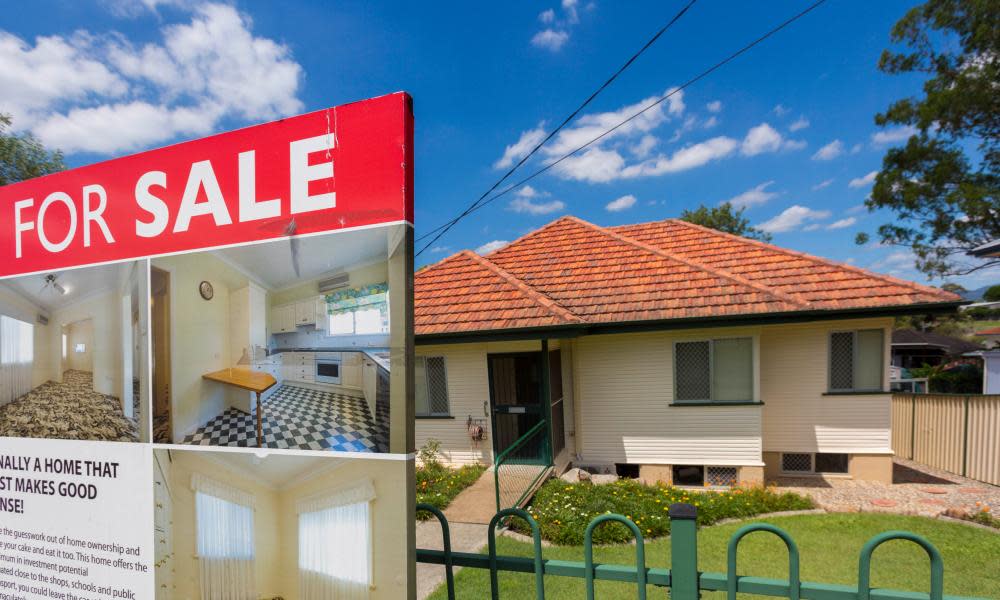Lending on new home loans plunges in biggest monthly drop in Australian history

The Morrison government will be under new pressure to bulk up its measures to stimulate the housing sector after new loans for housing finance experienced the biggest monthly fall in the history of the Australian Bureau of Statistics’ housing data.
The new statistics back up anecdotal reports by those involved in the early part of the building process, such as architects and engineers, that the construction pipeline is drying up and the industry is heading for a dramatic slump.
The construction industry has so far weathered the Covid-19-induced slowdown better than most, with building sites continuing to operate. But with the sector accounting for nearly 10% of jobs, the broader economic malaise now appears to be biting.
Related: Homebuilder grant: as construction dries up, NSW, Victoria and Qld yet to sign on to scheme
In May 2020, new loan commitments (seasonally adjusted) fell 11.6% for all housing.
The value of new loan commitments for owner-occupier housing fell 10.2%, while investor housing fell 15.6%.
Business construction loans rose by 3.6% in May, but this data is volatile and it will take some months before a clear trend emerges.
“For housing, the number and value of loan commitments for existing dwellings fell strongly, reflecting restrictions in late March and April on open houses, auctions and people’s mobility in general,” the ABS said.
But economists warn the slowdown in lending is usually the harbinger of something more fundamental.
“For three months Labor has been telling the government that the housing construction industry is about to go off a cliff,” the shadow housing spokesman, Jason Clare, said.
“The statistics released today by the Australian Bureau of Statistics emphatically show that warning was correct. New home loan commitments fell a record 11.6% in May.
“This massive drop in new home loans will lead to a drop in new housing construction and job losses in the housing construction industry.”
In June, the government announced a stimulus package called “homebuilder”, which offers grants of up to $25,000 towards renovations and purchases of new homes.
But more than a month later, only one state – Tasmania – has begun accepting applications and processing them. The federal government did not consult the states before devising the scheme, which has been criticised for being too complex.
The states are required to assess that the applicant is an owner-occupier, that they meet an income test (for singles up to $125,000 or $200,000 for a couple), that the value of a new property being purchased is within the cap of $750,000 and in the case of renovations that they are within a cap of $150,000 to $750,000, and that the value of the property being renovated does not exceed $1.5m.
Related: Covid-19 recession causing job losses in older workers and housing stress in young
The states will also have to be satisfied that the contract with the builder is signed by 31 December and that it will begin within three months.
Most states have set up websites and have signed agreements with the federal government but they are still working through how to administer the scheme and have not begun to accept applications. Tasmania is however up and running.
The federal opposition is calling on the government to dramatically step up stimulus measures for the sector with a focus on investment in social housing and upgrading public housing, to solve homelessness at the same time.
There was also new data showing that over 10% of homeowners are experiencing some level of financial stress.
The Australian Prudential Regulation Authority revealed that 11% of housing loans valued at $192bn were being given repayment deferrals by the major banks as part of the banking sector’s measures to assist homeowners.
Its survey of 21 major financial institutions also found that 18% or all business loans are on repayment pauses at the moment.
As well as taking advantage of the banks’ offers to defer repayments, the ABS data also showed customers were swapping to attractive fixed rate loans, which have driven sharp increases in refinancing of home loans.

 Yahoo News
Yahoo News 
